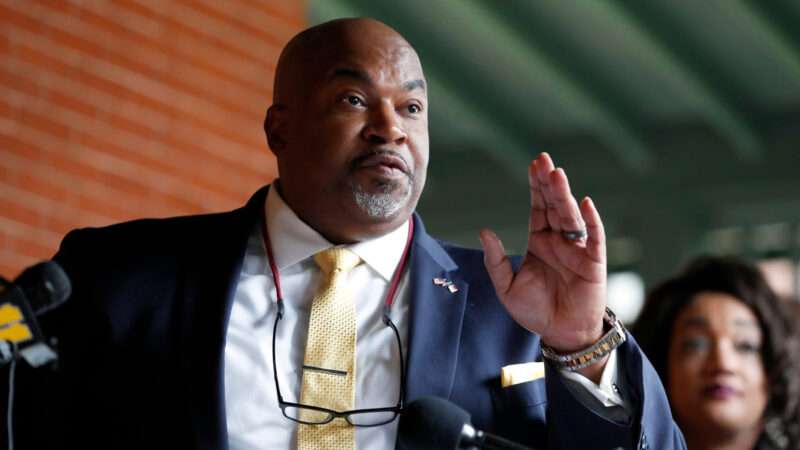
This week, a gubernatorial candidate filed a defamation lawsuit against a major news outlet and a private citizen. The suit will likely fail, but not before causing headaches for the defendants.
In September, CNN's Andrew Kaczynski reported that North Carolina Lt. Gov. Mark Robinson, currently the Republican nominee for governor, had made several bewildering and offensive comments over the years on the internet forum Nude Africa. According to the CNN report, Robinson—who is African American—yearned for the reinstitution of slavery, called himself "a black Nazi," and detailed his outré sexual practices and appetites.
Robinson denied the reporting and vowed to remain in the gubernatorial race. This week, nearly a month after the article was posted and just three weeks before the general election, Robinson filed a defamation lawsuit against CNN and Louis Love Money, lead singer of the North Carolina–based band Trailer Park Orchestra.
Money was the main source for a September 2024 article in the North Carolina online magazine The Assembly that alleged "Robinson was a frequent customer in the 1990s and early 2000s" of several 24-hour porn shops where Money worked, coming in "as often as five nights a week to watch porn videos in a private booth." Money further claimed to have sold Robinson "hundreds" of bootleg porn videos on the side and said Robinson still owes him $25 for one.
The previous month, Trailer Park Orchestra had released a music video for their song "The Lt. Governor Owes Me Money." Reached for comment about the lawsuit, Money told Reason via social media message, "I hope it gets Trailer Park Orchestra another 10,000 views on YouTube. That's my statement lol."
In the lawsuit, Robinson contends that he was not a customer of the porn shop but instead "worked at Papa John's pizza" nearby and "would occasionally bring over free pizza and socialize" with Money. The lawsuit suggests that the music video, The Assembly article, and the CNN report are all related. "Within weeks of this then-obscure, barely-viewed Music Video being published," it says, Money "was interviewed by a major online publication with links to George Soros" and made "false allegations" about Robinson. "We're not sure where that claim is coming from," Kyle Villemain, cofounder of The Assembly, told public radio station WUNC, saying the publication receives no funding from Soros.
"Sixteen days after the Assembly Article," the lawsuit continues, "CNN piles on with its own impeccably timed and recklessly false hit piece," which it published "despite Lt. Gov. Robinson's explicit denials." (The article was published the day before North Carolina's deadline for removing a candidate from the ballot.) The lawsuit further contends that Robinson's personal information was "previously compromised by multiple data breaches" and that "any person could have purchased and/or used Lt. Gov. Robinson's data to create accounts all over the internet."
The lawsuit claims that CNN and Money caused Robinson "significant damages, including direct damages, damages to his reputation, public disgrace, humiliation, embarrassment, mental anguish, distress, and anxiety." Although he "can never be fully compensated for the damage done by Defendants' lies," it says, he is seeking "an amount to be proven at trial, but no less than fifty million dollars."
Robinson's lawsuit faces challenges, primarily because it is more difficult for public figures to prove defamation than it is for private individuals. To prove defamation, the Supreme Court ruled in the 1964 case New York Times Co. v. Sullivan, public figures must show that a statement was made with "actual malice"—meaning "with knowledge that it was false or with reckless disregard of whether it was false or not."
The CNN article explains in detail how Kaczynski found the reported Nude Africa comments. It says he cross-referenced forum posts with publicly available personal and biographical information about Robinson. Such extensive care would not indicate "actual malice." But proving that claim may not be the point of the lawsuit.
"Anyone that does First Amendment law for more than a few weeks [will recognize] the hallmarks of this lawsuit being a joke," North Carolina attorney T. Greg Doucette tells Reason. "From end to end, it reads like a document whose sole job is…providing air cover for his allies. It's not something they're going to win." He says the lawsuit contains "no evidence" that either CNN or Money "acted with reckless disregard for the truth" and instead relies on "hand-waving bullshit."
Doucette says Robinson's lawsuit has all the telltale signs of a SLAPP—a "strategic lawsuit against public participation," intended to bully someone into silence based on constitutionally protected speech. By definition, SLAPP claims are meritless and unlikely to survive a motion to dismiss. But going through the process can still be prohibitively or ruinously expensive.
"If you're a defense attorney defending this type of case, you're billing by the hour," Doucette says. "That tends to run up the bill pretty quickly because plaintiffs will bury you under dozens of frivolous requests, knowing that it's going to make things expensive, and hope that increases the likelihood that you're going to settle to make it go away."
SLAPPs are often deployed by companies or politicians against private individuals or news outlets as retaliation for embarrassing or inconvenient speech. Many states have adopted anti-SLAPP laws, which allow defendants to block meritless lawsuits. In some cases, a plaintiff filing a dismissed SLAPP can even be forced to reimburse the defendant's attorney fees. But one state that notably lacks an anti-SLAPP statute of any kind is North Carolina—meaning state residents have no mechanism by which to defeat meritless lawsuits punishing them for their protected speech without mounting a full (and expensive) defense.
True or not, the allegations against Robinson certainly have hurt his political career. In the wake of the CNN article, most of his campaign staff quit, as did half of his staff in the lieutenant governor's office. In recent polls, he trails his Democratic opponent by seven to 12 points.
The post Mark Robinson Files Frivolous Lawsuit Against CNN and a Local Musician appeared first on Reason.com.







